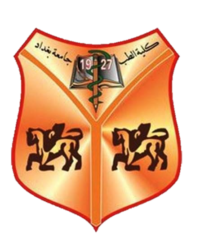Curriculum Description
This course description provides a necessary summary of the most important characteristics of the course and the expected learning outcomes for the student to achieve evidence of whether they made the most of the available learning opportunities. It must be linked to a description of the program.
General Description
| Category | Details |
|---|---|
| Name of Organization: | Baghdad College of Medicine |
| Department: | Biochemistry department with Medical Education Unit |
| Module Name: | Student Self-Component |
| Course Pattern: | Seminars, small groups, library hours, discussion, presentation, mentoring |
| Semester and Year: | 1st Year / Semester 1 and 2 |
| Total Course Hours: | 24 hours (6 hours lecture plus writing and preparing the research) |
Goal of the Course
The goal of the course is to teach students to choose and write scientific topics and present them in the form of slides, with the cooperation of a number of students supervised by a number of professors in scientific branches. This course is supervised by Professor Shifa Jamil Ibrahim and Professor Dr. Maysa Jalal Majeed.
Outcome of this Module
A. Cognitive and Theoretical Goals:
- Methods of choosing a scientific topic
- Search for sources on the topic
- Adopting the correct method in writing scientific reports
- Work collaboratively
- Trying to avoid drawing inspiration from research
- Knowing how to develop scientific sources
B. Skills:
- Using the computer to follow the course objectives
- Using computers to write scientific topics
- Presenting the course in the form of a scientific lecture and discussing it
- Presenting the completed work in PowerPoint format on CD and printing
Methods of Learning
Using the computer and using the college website in publishing reports and distributing students among supervising professors.
Methods of Assessment
Weekly supervision by the professors in 2-hour duration, including directing the students to increase their ability to accomplish the report and establishing the day of discussion which is set up in the beginning of March in each year. Assessment is based upon the discussion of the report made.
Values and Sentimental Goals
- Gradually preparing cadres capable of scientific thinking in addition to medical information.
- Increasing the level of knowledge in preparing research, methods of writing it, and presenting it in the form of a lecture.
- Paying attention to mastering the English language during the presentation.
- The student is evaluated individually on all their activities during the research period until the day of discussion, and is determined by grades placed on a form filled out by the supervising professor that determines the overall activities.
General and Qualifying Skills
- Weekly discussion by the professor
- Discussing the achievement weekly by the supervisor
- Students review the supervisor weekly and are assigned grades
- Correcting and guiding students about their achievements until the full report is prepared
Infrastructure
Eight weeks each of 2 hours, of preparing the scientific report through lectures and report writing. Assessment done by using a special formula for each group.
Resources
Course Books Required: Lectures for medical education in which he explains the methods of writing a report, the extraction process, and definition In the educational unit with all the scientific topics chosen for this purpose (explanation in the form of lectures). Displayed on the college’s website.
Main References (Sources): It is included in the scientific topics chosen by the student and under the supervision of the supervising professor.
Recommended Resources: Books, scientific magazines, and websites, depending on the chosen topic.
Course Development Plan
Decreasing the number of students in each group to maximize the benefit of doing the report and making student lists early in the year to organize and distribute the students earlier.

